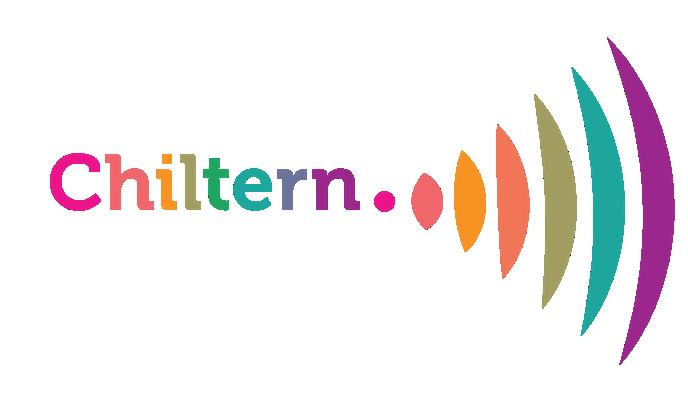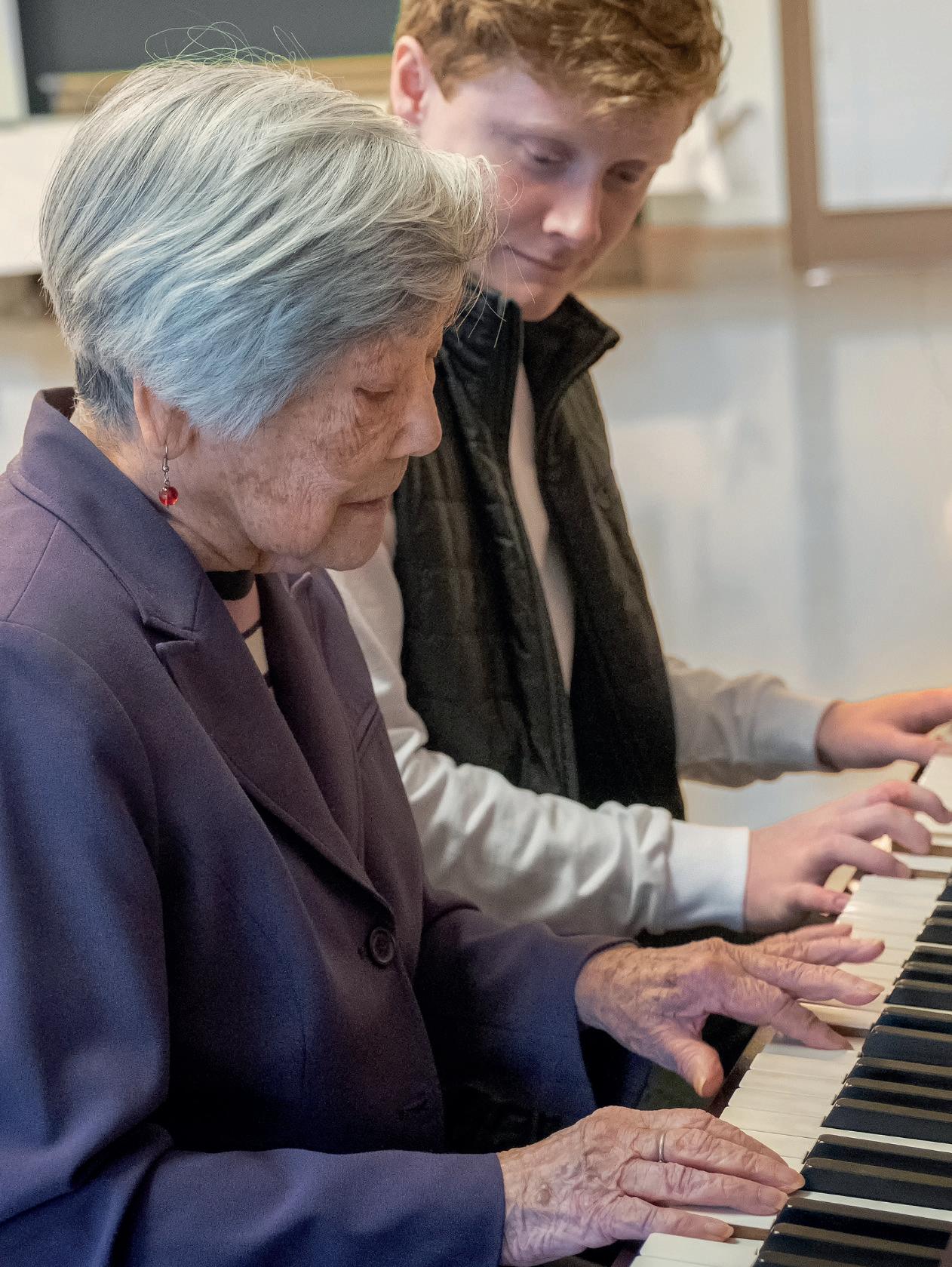Annual Report 2022-2023



Contents 5 Introduction 6 How we work 8 Our Impact 12 Raising Vital Funds 14 Focus: Inclusion 16 Focus: Sustainability 18 Focus: Training 20 Looking Ahead 2
“Music therapy has given us more understanding of how music can reach people with dementia, even just through breathing and observing the whole body. I think it’s amazing, absolutely brilliant.”
Activity Coordinator, Netherhall Care Home
3

4
Hello
life.
This report is aiming to provide a snapshot of the projects and services that the team at Chiltern Music Therapy has been involved with over this last financial year*.
At its core Chiltern is all about the people that work with us and the clients, families and other professionals who we support through our work across England. We are lucky to have such a passionate and dedicated team and are excited to have an opportunity to share what we do with others.
Our guiding values to Care, Listen, Deepen, Dare and Share, mean that every person we come into contact with matters to us, not just as an opportunity to provide our services, but as a potential agent for change, a partner, collaborator or advocate of our profession and what we do. We continue to push the boundaries, daring to be different and passionately sharing our knowledge, experience and human stories.
We hope that you enjoy reading about our work and always welcome any opportunity to discuss it further with you.
*Our financial reporting year is changing, so this report covers 9 months only from August 2022 - March 2023.
5
At Chiltern Music Therapy we strive for a caring world where music therapy is the transformative thread in everyday
Together we harness the power of music , inspire through human story and fascinate through science to light up a network of champions.
How We Work
Our team at Chiltern is ever evolving. In 2019, we made the decision to become a self-managing organisation and in 2021 we became fully employee owned, welcoming our new Board of Directors and Membership Council. Chiltern continues to operate within a circle structure, each ‘circle’ representing a different department responsible for a specific area of the organisation. All staff members sit within a hub or virtual ‘home’ within Chiltern, using this space to connect with regionally based peers, discuss caseloads and share key thoughts/feedback with the organisation. Each of our team members continues to bring a wealth of experience and energy, driving every part of our work and organisation forward.

Our current organisational structure

6
Human Story: Maureen


Maureen (not her real name) is in her 80s and is living with dementia in a care home. She often experiences anxiety and can be reluctant to leave her room to take part in activities. When Maureen first started coming to the music therapy group, she was uncertain and needed support and encouragement from staff to attend the session. Talking to her Music Therapist, Becky, Maureen was disparaging about her own musical abilities, recalling unkind comments that a family member had made about her singing. However, she soon demonstrated that she had a beautiful singing voice as she joined in with every song that the group chose. Other group members complimented her singing.
The sessions included group improvisation on percussion instruments. In early sessions, when the Music Therapist, Becky offered Maureen an instrument, she would decline. Becky had a sense that Maureen was scared of “getting it wrong”. Maureen always joined in by clapping along to the rhythm, and as time went on she grew in confidence. She began to play smaller instruments and gradually moved on to larger ones. Staff reported that Maureen’s increased confidence transferred to other areas of her life as she was more willing to leave her room, join in with activities, and interact with other residents.
7
Our Impact
As a therapy organisation we consider our impact from varying perspectives. As therapists we think about the best way to observe and measure outcomes with each of our clients in order to provide them with the optimum support for their needs. Organisationally we want to measure how many people we have been able to reach and support through our services, and how effective our services are. Additionally, we have also been seeking to broaden our reach to help as many people as possible to understand about the power of music therapy. We do this through our social media, our trainings ,and through attending and presenting at exhibitions and conferences.
We are privileged to continue supporting clients across the ages - our youngest was 24 weeks and our oldest client was 98 - and in a range of settings; in the community at home, in residential settings, in hospitals, in schools, in rehabilitation. Whilst digital continues to play an important role in our offer (and always will do) 92% of our clients are now seen in person again.
Highlights from the year include:
• Expanding our external training programme, including a new support programme for newly qualified Music Therapists.
• Providing the music therapy clinical component of the international research study measuring Music Interventions for Dementia and Depression in Elderly Care (MIDDEL) in collaboration with Nottingham University.
• Expanding our clinical hub in Chesham to a full day’s service.
• The launch of our user-led Insights Group to ensure we are truly listening and responding to the needs of our clients.

8
We have been continuing to use our communications channels, including social media (Facebook, Twitter, Instagram and LinkedIn), website and newsletter to grow a community of music therapy champions so that more people will know about the power of music therapy. Over the last 6 months we were able to reach over 100k people across our social channels and we engaged with 4000.
Highlights from our communications were:
• Our Use Your Voice campaign which ran throughout August designed to empower people to ‘use their voice’. This also included an exciting collaboration with Renée Yoxon, a trans voice coach.
• Our Music Therapist, Daryl being interviewed on BBC Radio 1’s Newsbeat.

• Our Christmas Campaign ‘Song Advent Calendar’, in which we wrote a song with our social media followers.
• Chiltern Choice, a monthly wrap-up of inspiring TV shows, Podcasts, Literature, Music and more, recommended by our team

9
For 2022-23 we have shortened our financial year to bring it in line with the traditional tax year, which means that we are only reflecting on nine months instead of twelve, with a resultant impact on the numbers. Numbers alone however don’t tell the full story of our impact; the human stories are what really brings it alive.
This year, for the first time, we have been measuring reasons for referral to music therapy. Overwhelmingly, the most common reason for referral is for Social Emotional and Mental Health support (35.5%). This is perhaps not surprising given the challenges so many are facing post Covid and with the cost of living crisis, and, in particular, the lack of timely support for children and young people’s mental health.


10


Raising Vital Funds
From August 2022 to March 2023, fundraising remained a key focus for Chiltern Music Therapy. Due to the cost of living challenges, the competition for funding has increased substantially however we successfully secured a number of grants. These include:
• The Leicester, Leicestershire and Rutland Living Well with Dementia Grant Fund
• Mobbs Memorial Trust
• Heart of Bucks General Fund
• Postcode Society Trust
• Buckinghamshire County Council Community Prevention Fund 2023
• Rothschild Strategic Fund
These grants, combined with the support of our corporate and individual donors, enabled us to expand our reach and provide transformative music therapy experiences to those in need. Conversations with, and support from individuals and organisations have flourished during this period. We continued to explore our connection and some future developments with Yamaha in the UK and in Europe, supporting them with content creation, and also began an exciting partnership with Dolby and with Ableton. We have also spoken to Jazz FM, Pioneer and Sonos and will continue to build these relationships in the year ahead.
In March 2023 Chiltern was also lucky enough to be chosen as Charity of the Year by Waddesdon Manor. This means that the team at Waddesdon Manor will support us across the next year through a variety of fundraising and profile raising events, as well as providing us with a generous financial donation. We are really excited to have their support and to be working together.
Our fundraising efforts also involved community events, online campaigns, and corporate sponsorships, which raised funds and increased awareness. We are grateful for the trust and investment in our organisation, and we remain committed to securing sustainable funding for our mission of enhancing lives through music therapy.
12
Human Story: Harry
Our Music Therapist, Fliss, began sessions with 5 year old Harry (not his real name) last September. Harry was referred to music therapy in his SEN school as he wasn’t interacting with anyone in his class or the teachers. He only seemed happy when he was playing on an iPad or phone. He spent a lot of time finding adults to give him access to the technology and would become very distressed if he didn’t get what he wanted. The teachers thought he was trying to get attention, and due to his lack of communication, it was very difficult to work out what he wanted or needed.
During the first few sessions with Fliss, Harry could only manage 10 minutes of music therapy. He stood with his coat on by the door or far wall, watching Fliss as she played the guitar and sang to him. He remained silent and didn’t attempt to play any instruments.
Fast forward to the end of the term and Harry was making so much progress. He started coming closer to Fliss and peeking into the instrument box. During one session, he went up to Fliss, removed her guitar and sat on her knee, putting the guitar around them both and gently strumming. This, it turns out, was the start of something new for Harry. He had a whole new level of confidence and now communicates in so many ways.
He is vocalising, laughing, leading Fliss’ hands and playing instruments. The sessions, once only 10 minutes, now last for over 30 minutes.
Fliss says of their session:
“Music therapy has given Harry the confidence to connect and build a relationship with another person, explore his surroundings safely and get enjoyment from a shared activity. He is appearing more explorative and happy in the classroom and the staff have commented how communicative he is becoming.”
13
Focus: Inclusion

Inclusion has continued to progress this year and we are pleased to be able to share some of the improvements that have been made as a consequence of the continued work of the team as well as the plans we have in the pipeline.
We completed our second equal opportunities review in 2023, and, for the first time, this has included analysis on the demographic of our service users and recruitment procedures. Since the last review in 2021, we have partially achieved targets to increase diversity of the team, updated policies and procedures in regard to equal opportunities for staff, and set up our first service user group (the Chiltern Insights Group). Based on the data we have collected this year, we have set new targets and strategies to further increase diversity of the team and the senior leadership team to better represent the communities we serve. We will also continue providing EDI training for our team and inclusive training programmes for AHPs so that awareness and positive change can be made for all in regard to inclusive practice.

14
As part of our strategy to become led by our service users, the Chiltern Insights Group was launched in September. Participants are adults who are currently or have previously used our services, and so far, they have been consulted on two organisational projects. Our Insights Group Facilitator, Sabina, coordinates the group, ensuring communication between the group and the Chiltern team, and promoting accountability so that we act on their advice and make progress. This group is still in the early stages of development but it has shown a positive impact on our work already and will help us to deliver effective and inclusive services. It is hoped that this is the start to building further initiatives, such as service user groups for our children and young people, and updating policies and procedures to ensure that the views of our service users inform everything we do as an organisation.
The next priority will be to update our policies and procedures and to measure our social impact through an integrated approach across environmental, social and corporate governance factors. This will help us to become a more purposely responsible organisation with consideration and cooperation between all of these issues, and make sure that marginalised people will further benefit from these changes at a systemic level.


15
Focus: Sustainability
The world is experiencing a climate and health emergency, with climate change being described in the Lancet as “the greatest threat to global health of the 21st century”. At Chiltern we know we have a responsibility to act in an environmentally sustainable manner, and have committed to reducing our impact on the environment.

Over the past 12 months we have implemented a carbon emissions monitoring process in order to record emissions related to travel, office energy and water consumption, and office waste. This set of figures will be used as the baseline against which future performance will be measured.
N.B. tCO2e = the total amount of all greenhouse gases emitted, measured in metric tons of carbon dioxide equivalent

16
As can be seen from the chart, our key areas of impact were:
• Staff travel: 93% of our carbon emissions from 2022/23 came from business travel using employee owned vehicles.
• Air travel: although there was only one flight paid for by the organisation during this period, this contributed to 4.7% of our total carbon emissions.
• Office energy and water use: a relatively small 1.2% of our total carbon emissions were created from the running of our small office (energy, water and waste).
Energy efficiency actions
We recognise that we have an impact on the environment by how we operate. We have committed, where practicable, to reduce this impact and have implemented the following actions:
• Staff driving reduction strategy
• Staff training on office related activity
• Implementation of a new Flying Policy
• Engagement with staff to promote a culture of environmental sustainability

• ‘Second-hand first’ policy for instruments
• Trainings and meetings moved online whenever possible Pension fund education for staff
Setting a Net Zero Target
We will spend a period of 6 months consulting with our Board, team, and Chiltern Insights Group, in order to work out what is achievable before setting a Net Zero Target and relevant action plan.
17
Focus: Training
In the period from August 2022 to March 2023, Chiltern Music Therapy made significant strides in enhancing our training offer, successfully delivering over 35 training events encompassing engaging presentations, talks, lectures and training sessions. Our diverse audience, totaling approximately 500 attendees from across a wide array of sectors, including education, healthcare and social care, reflected our commitment to promoting the therapeutic benefits of music across disciplines.

We delivered a diverse range of trainings to various organisations this year including music schools and trusts, care homes, international Music Therapy organisations and mental health settings. Individuals booking onto our trainings ranged from Music Therapists, professionals from other sectors, families and carers. While we continued to offer remote options, we were delighted to once again have the opportunity to deliver some of our trainings, talks, and workshops in person.
Our commitment to inclusivity and awareness led us to incorporate new training topics such as Gender Awareness in Music Therapy, Sensory Processing and Music Therapy, ‘Race Issues in Music Therapy, and ‘Neurodiversity Affirming Approaches in Music Therapy. These initiatives aimed to foster understanding, promote equality, and enable practitioners to better serve their diverse clients.
As part of our dedication to raising the profile of the profession, we introduced a new experiential workshop, Music Therapy as a Career. This workshop provides aspiring Music Therapists with valuable insights into the day-to-day work and guidance on routes into the profession.
18
A highlight of Autumn 2022 was the launch of NEST, our groundbreaking development programme designed to support and nurture newly and recently qualified Music Therapists. This comprehensive programme offers peer group supervisions, mentoring with our most experienced staff, accredited CPD sessions and a community of fellow Music Therapists. At Chiltern we are passionate about nurturing and developing Music Therapists throughout their career. The feedback from our first cohort has been overwhelmingly positive, with participants expressing gratitude for the opportunity to connect with peers facing similar challenges and engage in CPD together.
“I have really enjoyed connecting with and meeting other music therapists at a similar stage in their career. It can be a very isolating role and experience so this has been great. It has also been great to have extra opportunities for CPD on such a wide range of topics. I have found the topics to be well thought through and relevant”.
 NEST Participant
NEST Participant
During this period we grew our training newsletter audience to nearly 300 subscribers and enhanced our online presence via our social media channels. The positive feedback received, especially on the option to access recorded sessions and slides, attests to the success of our endeavours.
As we look forward, we are excited to continue expanding our training offer and broadening our scope across various sectors.
19
Looking Ahead
We are looking forward to the year ahead. The profile of music therapy as an impactful and effective intervention continues to grow and we are excited about all of the opportunities that this offers.

At the same time, Chiltern, like many organisations, continues to face challenges from the continued increase in costs, which affects not only our expenses but, of course, also has an impact on the clients and services with whom we work. As a not-for-profit organisation, we know the importance of focusing on remaining financially sustainable, growing, and innovating through our networks, while maintaining inclusivity at the heart of everything we do.
Here are a few of the things we are particularly looking forward to in the coming year:
• The launch of our Music for Mental Health fundraising appeal focussing on raising money to fund access to music therapy specifically for Children and Young People.
• The launch of a new Neurologic Music Therapy service at Moor Green Hospital in Birmingham.
• Starting a new Neurologic Music Therapy pilot with Salford Hospital
• Increasing the number of music therapy hubs across the geographic areas we work in.
• Building relationships with our corporate partners to help us raise awareness of the impact of music therapy.
• Acting on our Net Zero targets led by our Environmental and Sustainability Lead.
• Continuing to support our existing and new clients at the centre of everything we do and the reason that Chiltern exists.
20
Human Story: Richard
Richard (not his real hame) has Down’s Syndrome and experienced early developmental trauma. Richard has high anxiety levels, which affect his ability to manage and express his emotions and behaviour, and sometimes results in periods of being excluded from his Secondary SEN School in the south of England.

In late 2020, Richard began working with our Music Therapist, Gabrielle. He was initially reluctant to even come into the music therapy room, but gradually began to develop a trusting relationship with her. This enabled him to come into the room and begin to engage, if only fleetingly at first.
Through the therapy sessions, he has been able to safely explore his emotions and emotional responses, and work on communication and social skills. And most importantly, it provided opportunities for him to feel positive about his achievements and begin to develop a stronger sense of self.
Changes in Richard’s family circumstances and the subsequent impact on his behaviour within school meant that sustaining this level of interaction became challenging for him. So the focus for the therapy evolved and instead offered him the opportunity to have consistent and reliable emotional support. Gabrielle felt it was important that whilst many other areas of his life were uncertain, he still had the opportunity to maintain the relationship with the Music Therapist as well as key school staff. Richard really seemed to value this andand he often expressed that he was looking forward to seeing the therapist when arriving at school on his music therapy day.
Through support from school and therapy sessions, Richard has been able to integrate back into the school community and is hoping soon to be able to stay in school for the whole day, every day.
21
Chiltern Music Therapy, Kings Head House, 15 London End, Beaconsfield, HP9 2HN Tel: 01442 780541 Email: info@chilternmusictherapy.co.uk Web: www.chilternmusictherapy.co.uk
























 NEST Participant
NEST Participant

